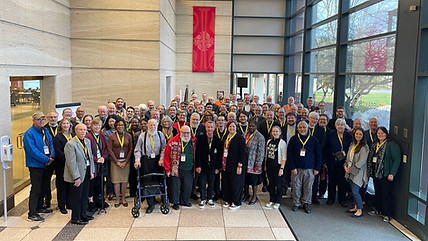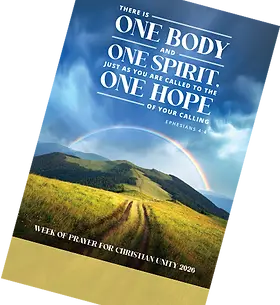Ecumenical and Interreligious Unity

Why is this important?
The ecumenical movement is the Church's response to Jesus' prayer for his disciples in John 17:21:
"that they may all be one. As you, Father, are in me and I am in you, may they also be in us, so that the world may believe that you have sent me."
We join our prayers for unity with that of our Lord, and offer our endeavors toward unity to the Holy Spirit with the full understanding and motivation that the end purpose of ecumenism is evangelical:
"That the world may believe."
The Episcopal Church, “Handbook for Ecumenism”, March 2013
Ecumenical Relations
“Love God with all your heart, soul, mind, and strength; and, love your neighbor as yourselves.”
Mark 12:29-31
Interreligious Relations
Episcopalians take the twofold mandate, "Love God with all your heart, soul, mind, and strength; and, love your neighbor as yourselves," with utmost seriousness. It informs our Baptismal Covenant promise to
“strive for justice and peace among all people,” and to “respect the dignity of every human being.” (BCP 851)
Because we have so promised, it is an act of Christian faithfulness to be in openhearted relationship with people whose religions differ from ours.
The Episcopal Church, “Holding Difference Together: Episcopal Theological and Practical Guidelines for Interreligious Relations”, 10 November 2023
Ecumenical means pertaining to the “whole inhabited earth.” It is used to describe the movement to restore unity among all Christians or to describe openness and self-examination shared with other Christians, so that Christ's prayer for unity might be fulfilled. It is sometimes used to describe any cooperative venture between communions.
Interfaith or Interreligious means activities by which good will, spiritual understanding and cooperation are fostered by people of all faiths.
Organization
The Episcopal Church supports ecumenical and interreligious work promoting understanding among all God’s people and unity among the churches. The Office of Ecumenical and Interreligious Relations does this through supporting the advocacy commitments of this church; ecumenical dialogues; and by providing resources. The work is about unity in diversity and building bridges. Through it we seek flourishing and abundance for all, and so ecumenical and interreligious work is also anti-racist work, creation care work, and is committed to the liberation of all God’s people.

Left: National Workshop for Christian Unity (NWCU), annual meeting in Chicago in November 2024.
Right: Episcopal Ecumenical and Interreligious Officers at NWCU's annual meeting.

The Episcopal Church in Wyoming is connected to the work of The Office of Ecumenical and Interreligious Relations of The Episcopal Church through its Diocesan Ecumenical and Interreligious Officer. The Ecumenical and Interreligious Officer stays connected through the Episcopal Diocesan Ecumenical and Interreligious Officer network to the work done by the Standing Commission on Ecumenical and Interreligious Relations on behalf of the General Convention of The Episcopal Church. The Diocesan Ecumenical and Interreligious Officer is responsible for ecumenical and interreligious advocacy and sharing of such information within the diocese. The Rev. Annemarie Delgado serves in this role for the Episcopal Diocese of Wyoming.
News
Full Communion with the Evangelical Lutheran Church in Bavaria
-
On June 7, 2025, The Evangelical Lutheran Church of Bavaria and The Episcopal Church entered into full communion. With the signing of the Sharing the Gifts of Communion (Augsburg Agreement), the two churches take a step toward uniting the greater body of Christians.
-
What does full communion mean? Among other things, being in full communion means that:
-
The denominations recognize that each church is a valid part of the one, holy catholic and apostolic church
-
Clergy from one denomination are allowed to serve in the other (with the approval of local bishops)
-
Church government or congregations are maintained and not merged
-
Worship and liturgy in either denomination’s churches is not changed
-
Neither denomination is required to adopt the discipline or moral teaching of the other
-

Steps Toward Full Communion with United Methodists
In May 2024, the United Methodist Church approved a resolution for full communion with The Episcopal Church, with a final vote expected at the 2027 General Convention. In response, the Episcopal Church passed Resolution A049, encouraging continued dialogue and planning for shared clergy and sacramental life. This agreement will affirm mutual recognition while maintaining denominational distinctions.

Local Partnerships: Episcopalians and Presbyterians
In March 2025, Episcopal and Presbyterian leaders in New York launched EPIC (Episcopal–Presbyterian Incubator for Collaboration), a local dialogue focused on “Local Sharing of Ministries.” This partnership explores creative ministry models for small and rural congregations and reflects a growing movement toward grassroots ecumenical cooperation grounded in shared worship and mutual support.

General Convention passes Interreligious Guiding Documents
The 81st General Convention of The Episcopal Church passed the following interreligious guideline documents:

Articles
Written and published in the Spirit of Wyoming
Resources
1700th Anniversary of the First Council of Nicaea: Living the Apostolic Way Today
The year 2025 marks 1700 years since the historic First Ecumenical Council in Nicaea, a foundational moment for Christianity. This milestone reminds us of our shared faith in the triune God and calls us to reflect on unity in a divided world.
Key Highlights:
-
Learn how the Nicene Creed became a cornerstone of Christian belief.
-
Engage with the Sixth World Conference on Faith and Order, addressing “Where now for visible unity?”
-
Celebrate a year of ecumenical events with the World Council of Churches and partners.

Week of Prayer for Christian Unity 2026
January 18–25, 2026
Theme: “There is one body and one Spirit, just as you were called to the one hope of your calling.” (Ephesians 4:4)
The Week of Prayer for Christian Unity is a sacred time for Christians to come together in prayer, reflection, and action. The chosen passage for reflection is Ephesians 4:4, where the Apostle Paul reminds the early Christians in Ephesus of the unifying power of the Holy Spirit. This verse calls believers to remember that, despite differences, all are part of the one Body of Christ and share a common hope through the Spirit.
Highlights:
-
“Making ‘shared hope’ the objective of our calling as Christians defines our membership in the Church in terms of worldwide fellowship in the hope of salvation and eternal life.”
-
“It serves as a powerful witness to the transformative power of the Holy Spirit when Christians of varied backgrounds come together with a shared goal and vision with authenticity and sincerity.”
Resources:
Join us in prayer as we seek the miracle of unity, inspired by faith and strengthened by the Holy Spirit.

World Interfaith Harmony Week
February 1-7, 2026
Love of God & Love of Neighbour – Love of Good & Love of the Neighbour
The World Interfaith Harmony Week extends the Two Commandments by adding ‘Love of the Good, and Love of the Neighbour’. This formula includes all people of goodwill. It includes those of other faiths and those with no faith.
Resources:

Links to ecumenical and interreligious resources:
Get Involved
To learn more or ask questions about ecumenical or interreligious relations in the Diocese of Wyoming, contact The Rev. Annemarie Delgado, Ecumenical and Interreligious Officer at: info@episcopalwy.org













